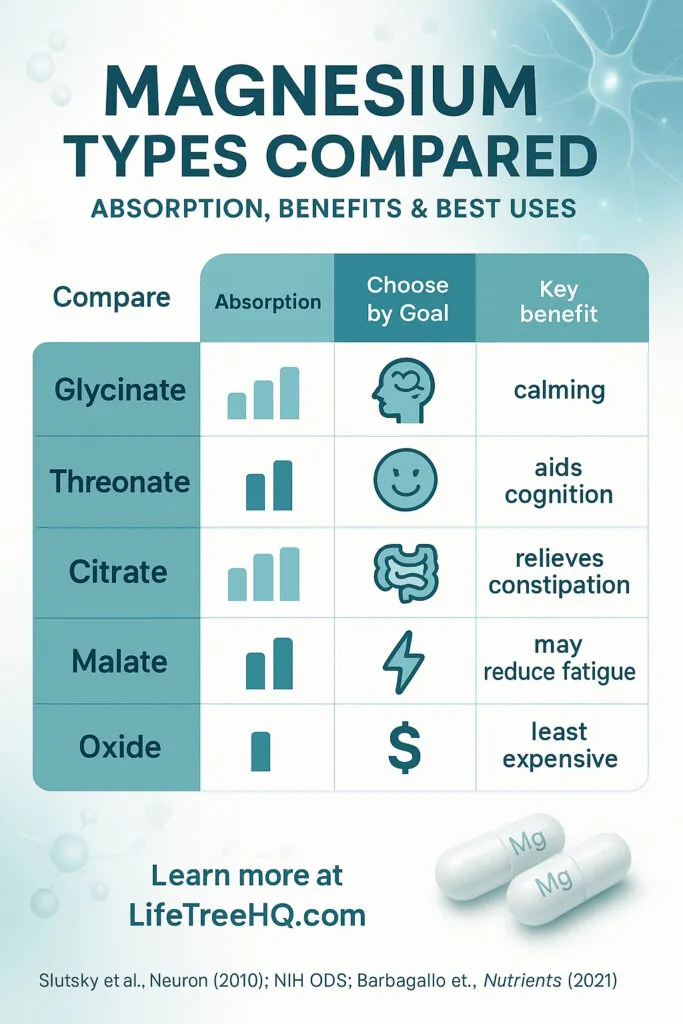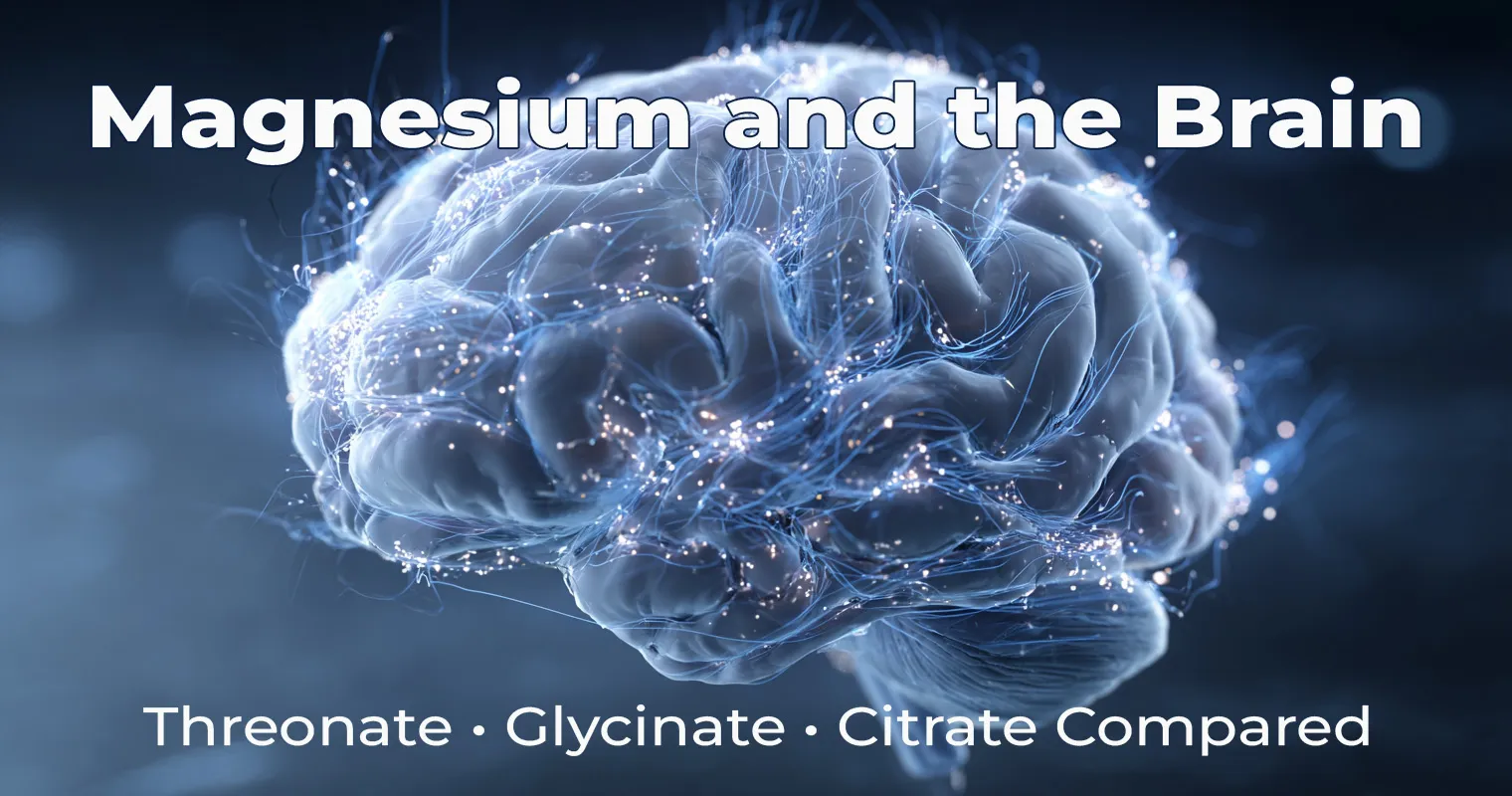Magnesium is one of the body’s most essential minerals—vital for muscle function, energy production, and brain health. Yet most people don’t get enough of it from their diet alone. Because different magnesium supplements absorb differently, choosing the correct form can make a big difference in how well it works for you.
This guide examines magnesium citrate, glycinate, and threonate as the top three supplement forms to determine their optimal uses for supporting digestive health, relaxation, and brain function.
Why Magnesium Form Matters
The body’s ability to absorb and utilize magnesium supplements depends on their bioavailability. The way magnesium salts interact with molecules determines their solubility, absorption rate, and target locations in the body.
- Magnesium citrate is well-absorbed and cost-effective, making it ideal for general supplementation.
- Magnesium glycinate is gentle on the stomach and promotes calm and relaxation.
- Magnesium threonate stands out for its ability to cross the blood-brain barrier and support cognitive health.
In short, the “best” magnesium form depends on your health goal.
Magnesium Threonate — Designed for the Brain
Magnesium L-threonate is a newer, more advanced form that combines magnesium with L-threonic acid, a vitamin C derivative. Its key advantage lies in its ability to cross the blood-brain barrier, a protective membrane that blocks most compounds from entering brain tissue.
Research from MIT and UCLA shows that magnesium threonate raises magnesium concentrations in cerebrospinal fluid, potentially enhancing learning, memory, and synaptic plasticity. Though more expensive and lower in elemental magnesium per capsule, it offers unique neurological benefits not found in other forms.
Best for: Memory, cognitive clarity, and brain aging support.
Consider if: You’re specifically targeting brain or cognitive support.

Life Extension Neuro-Mag
Life Extension Neuro-Mag features ultra-absorbable magnesium L-threonate, clinically studied for its ability to cross the blood-brain barrier and support memory, focus, and overall cognitive health.
- Non-GMO, gluten-free and manufactured in the USA
- Helps support your working or “short term” memory
- Plays an important role in supporting cognitive function.
Magnesium Glycinate: Calm and Gentle
Magnesium glycinate combines magnesium with the amino acid glycine, enhancing body absorption and reducing stomach-related adverse reactions. The calming properties of glycine make this supplement an ideal choice for individuals seeking to manage stress and improve their sleep quality.
The absorption rate of glycinate remains steady while providing excellent tolerance to daily doses of 200–400 mg, although it does not produce immediate serum magnesium spikes like citrate.
Best for: relaxation, stress management, and improving sleep quality.
Consider if: you have a sensitive stomach or use magnesium daily for calm and balance. The combination of magnesium glycinate utilizes magnesium in conjunction with glycine, which acts as a nervous system relaxant. The digestion-friendly properties of this form make it suitable for people who experience digestive issues from magnesium citrate.

Doctor’s Best Magnesium Glycinate Lysinate
Doctor’s Best delivers chelated magnesium glycinate for gentle, highly bioavailable support of relaxation, muscle recovery, and restful sleep—without digestive discomfort.
- Helps regulate melatonin, cortisol, and muscle function.
- Fortified by two amino acids for faster absorption and no upset stomach.
- Specially formulated to aid with supporting healthy, restful sleep.
Magnesium Citrate: Fast and Effective for Digestion
Magnesium citrate stands as a widely used and budget-friendly magnesium supplement. Research indicates that taking 300–450 mg of magnesium citrate daily effectively increases blood magnesium levels. The drug absorbs quickly because of its high solubility, but this property leads to occasional laxative symptoms in people who are sensitive to it.
Best for: Improving digestion, muscle function, and overall magnesium status.
Avoid if: You experience loose stools or digestive sensitivity.

NOW Supplements Magnesium Citrate
NOW Supplements offers a cost-effective magnesium citrate formula with excellent solubility to help relieve muscle tension, support digestive health, and maintain healthy magnesium levels.
- Critical for energy production and metabolism.
- Important for regulation of calcium balance.
- Critical for enzyme function, a required cofactor for an estimated 300 enzymes.

Which Magnesium Form Should You Choose?
| Magnesium Form | Absorption | Digestive Tolerance | Best Use |
|---|---|---|---|
| Citrate | High | Moderate | Digestion, muscle health |
| Glycinate | High | Excellent | Relaxation, sleep |
| Threonate | Moderate systemic, high brain | Excellent | Memory, focus |
If your goal is to improve brain function, magnesium L-threonate stands out as a notable option. For relaxation and sleep, glycinate is gentle and reliable. For general magnesium support, citrate remains a cost-effective and reliable choice.
Key Takeaway
The three magnesium forms offer bioavailable benefits for various applications. The blood-brain barrier permeability of magnesium threonate makes it the preferred supplement for cognitive health support. The body uses glycinate for relaxation purposes and long-term supplementation, but citrate serves best for digestive health and total magnesium supplementation.

Life Extension Neuro-Mag Magnesium L-Threonate, 90 Vegetarian Capsules Ultra-Absorbable Magnesium – Memory, Focus & Overall Cognitive Performance Boost – Non-GMO, Gluten-Free
$28.44 ($0.32 / Count)
MEMORY, FOCUS & COGNITIVE BOOST – Magnesium is essential for overall brain performance, but not all magnesium supplements are easy to absorb. Based on the latest research, we used magnesium L-threonate. Preclinical studies have shown that this highly absorbable form of magnesium can improve communication between brain cells because it can cross the blood-brain barrier and influence signaling pathways associated with learning, memory and focus.
FAQ
Which form of magnesium has the best bioavailability?
All three forms—magnesium threonate, glycinate, and citrate—are highly bioavailable, but their effects differ. Magnesium citrate absorbs quickly and supports digestion. Magnesium glycinate is gentle, calming, and ideal for sleep. Magnesium threonate is unique because it can cross the blood–brain barrier, making it the best choice for cognitive support and memory.
What makes magnesium threonate different from other forms?
Magnesium threonate binds magnesium to L-threonic acid, allowing it to cross the blood–brain barrier more effectively than citrate or glycinate. Studies have shown that it can increase magnesium levels in the brain, improve synaptic plasticity, and support learning, memory, and focus.
Is magnesium glycinate better for sleep and relaxation?
Yes. Magnesium glycinate is one of the gentlest and most calming forms. Because glycine naturally supports relaxation, this form helps reduce stress, ease muscle tension, and improve sleep quality without digestive discomfort.
What is magnesium citrate best used for?
Magnesium citrate is a fast-absorbing form that helps quickly raise magnesium levels. It’s also commonly used to support digestion and relieve mild constipation due to its gentle osmotic effect. It’s an excellent general-purpose magnesium for muscle and nerve function.
Can magnesium supplements help with cognitive function or brain fog?
Magnesium threonate shows the strongest evidence for brain health. Research indicates it can elevate brain magnesium levels, which supports clearer thinking, better memory, and improved neural communication. Other forms support general health but do not penetrate the brain as effectively.
How do I choose the right type of magnesium for my needs?
Choose magnesium citrate for digestive support and general magnesium supplementation, magnesium glycinate for relaxation and improved sleep, and magnesium threonate for enhanced memory, focus, and long-term brain health. Many people select their magnesium based on their primary health goal.
Can I combine different types of magnesium?
Yes. Some people use citrate for digestion, glycinate at night for relaxation, and threonate during the day for mental clarity. Combining forms is generally safe, but total magnesium intake should be monitored with guidance from a healthcare provider.
Sources:
Information supported by Neuron (Slutsky et al., 2010), U.S. NIH Magnesium Fact Sheet for Health Professionals, and Nutrients (Barbagallo et al., 2021).
You May Also Like
Looking to dive deeper into magnesium and natural sleep support? Here are a few related reads from Life Tree HQ:
- Magnesium Glycinate for Constipation Relief — Discover how glycinate improves digestion while supporting relaxation and gentle bowel regularity.
- Andrew Huberman’s Sleep Cocktail and Lifestyle Recommendations for Better Sleep — Explore neuroscientist Andrew Huberman’s science-based nightly routine for optimizing rest and recovery.
- Apigenin: A Natural Remedy with Anxiety, Sleep, and Antioxidant Benefits — Learn how this flavonoid supports calmness, better sleep, and cellular protection.
For a deeper scientific overview, see the NIH Magnesium Fact Sheet for Health Professionals — an excellent external reference on absorption and dietary intake.
References
- Slutsky, I., et al. (2010). Enhancement of learning and memory by elevating brain magnesium. Neuron, 65 (2), 165–177.
- U.S. National Institutes of Health, Office of Dietary Supplements. Magnesium Fact Sheet for Health Professionals.
- Barbagallo, M., et al. (2021). Magnesium and Brain Health: A Focus on Neuroplasticity and Cognitive Aging. Nutrients, 13 (3), 1072.
Affiliate Disclosure
This website contains affiliate links, which means that if you click on a link and make a purchase, we may receive a small commission at no additional cost to you. These commissions help support the content we create and maintain. We only recommend products and services we believe add genuine value to our readers.
Medical Disclaimer
The information provided on this website is for informational and entertainment purposes only and is not intended as medical advice. The content is not reviewed or approved by the Food and Drug Administration (FDA) and should not be used to diagnose, treat, cure, or prevent any disease. Always consult with a qualified healthcare professional before making changes to your diet, supplement routine, or lifestyle.

